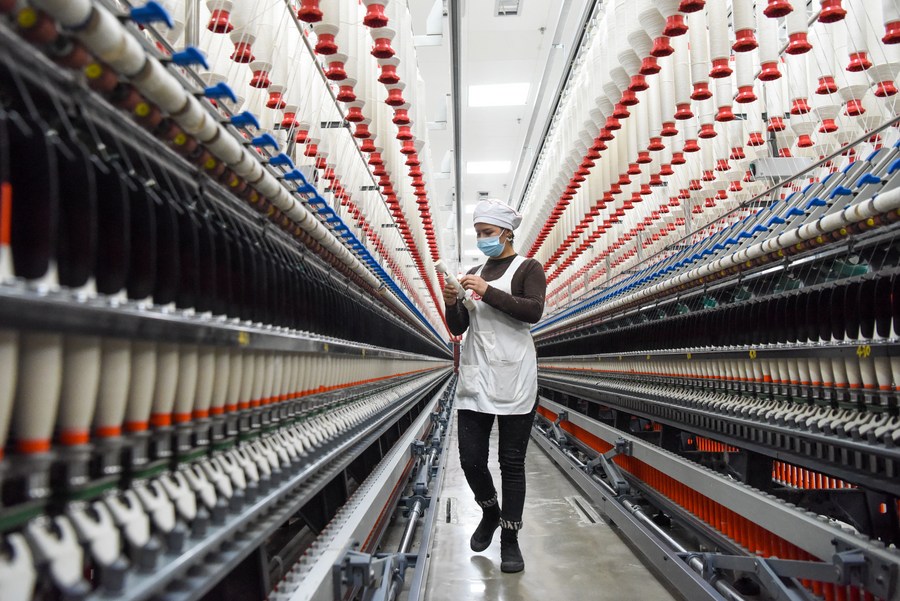Xinjiang signs agreements with 11 SOEs

A staff member works in a textile factory at the integrated industrial park in Moyu county of Hotan, Northwest China's Xinjiang Uygur autonomous region, Jan 11, 2022. [Photo/Xinhua]
38 projects expected to involve more than 611 billion yuan in investment
The Xinjiang Uygur autonomous region, a core area of the Silk Road Economic Belt that boasts rich resources, has embraced an important period of high-quality economic growth, its Party chief, Ma Xingrui, said on Saturday, adding that it welcomes more investment from centrally administered State-owned enterprises.
"We hope to deepen and strengthen cooperation with centrally administered SOEs in multiple sectors such as petrochemicals, coal power and coal chemical, clean energy, equipment manufacturing and infrastructure building," Ma said at a meeting in Beijing.
During the 14th Five-Year Plan (2021-25) period, 11 centrally administered SOEs plan to carry out 38 investment projects in Xinjiang. The total investment is expected to reach 611.7 billion yuan ($96.5 billion), according to cooperation agreements the regional government signed with the SOEs on Saturday.
This year, the 11 SOEs, which include China National Petroleum Corp, China Petroleum and Chemical Corp, and State Grid Corp of China, plan to invest a total of 108.6 billion yuan in Xinjiang.
Last year, total revenues of centrally administered SOEs in Xinjiang exceeded 1 trillion yuan after double-digit year-on-year growth, according to the regional government.
"China will continue to support the industrial transformation and upgrading in Xinjiang, and vigorously develop strategic emerging industries and modern agriculture in the region," said Hao Peng, chairman of the State-owned Assets Supervision and Administration Commission. "Centrally administered SOEs should strengthen their cooperation with local companies."
Sinopec, the world's largest refiner by volume, said that during the 13th Five-Year Plan (2016-20) period, it invested 45.7 billion yuan in Xinjiang. Last year, the company discovered 8.7 million metric tons of crude oil reserves and 2.29 billion cubic meters of natural gas reserves in Xinjiang.
"We have continued to improve the oil and natural gas sales networks in Xinjiang, and helped ensure local oil and gas supplies, Ma Yongsheng, Sinopec's president, said." During the 14th Five-Year Plan period, we plan to invest 80 billion yuan in Xinjiang, including an investment of 18 billion yuan this year. We would like to build a demonstration project for the coordinated development of oil and gas and the new energy sector."
State Grid said it plans to invest more than 114 billion yuan in Xinjiang during the 14th Five-Year Plan period, and increase the transmission of power from Xinjiang to other parts of the country. It will also implement a rural power grid consolidation and upgrading project in Xinjiang.
"The rapid economic development in Xinjiang has raised demand for power, and it has brought us significant business growth opportunities," said Xin Bao'an, president of State Grid. "We will help enhance the sustainable development capacity of the power grid in Xinjiang."
Meanwhile, COFCO, China's largest food processor, said it helped Xinjiang sell more than 1 million tons of cotton in the last two years. The company supported the local industry in coping with recent changes in international trade that brought new challenges to the development of China's cotton industry.
zhuwenqian@chinadaily.com.cn
 Attractions
Attractions Dining
Dining Culture
Culture